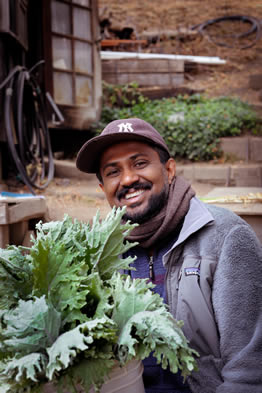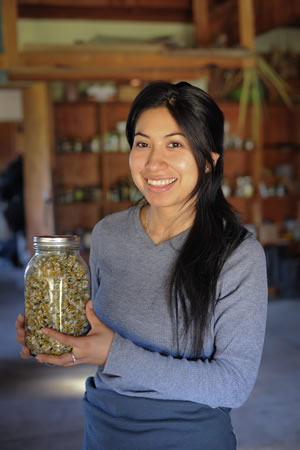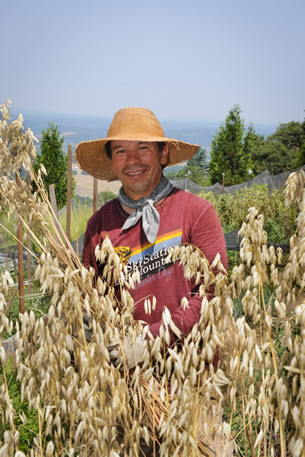Summer 2012 Interns In Sri Lanka, the culture is supportive of natural organic systems both in agriculture and medicine. Many farmers resisted hybrid seeds and chemical fertilizers because of their faith in natural systems, and also because the new varieties didn't always work. I saw this for myself when I visited a farmer in his village. The village was flooded, but on his farm, the traditional variety of rice was strong and vigorous, while the newer varieties all around his fields had died. That was it! I saw that instead of going forward with new technologies, we had to do a U-turn and study older technologies. The Farmer Federation received money to develop traditional farming practices for marginal, flooded, saline and drought areas. We started influencing the government, university and private sectors. When the Department of Agriculture still thought our ideas foolish, we said, "Go to the farmers' fields and observe for yourselves." Then in 2008, the Southern Province of Sri Lanka joined with the Farmer Federation to do a demonstration with government agents using traditional seeds and practices on differing marginal lands. They used government funds to help train people, provide equipment, support cultivation, marketing, labeling and certification. This program has been very productive and has set an example for other provinces. After 14 years with the Farmer Federation the program was going so well that I decided to try something new with home gardens, to increase the use of land resources. Through MESA (Multinational Exchange for Sustainable Agriculture), I became an Ecology Action intern at Golden Rule Mini-Farm. My special project here is to create a demonstration area to show people how they can utilize their backyard space introducing Biointensive techniques. When I return to Sri Lanka, I want to introduce these new concepts to the government and the non-governmental organizations I have already worked with, so that backyard gardens become both productive and pleasing to the eye, as in nature. In this way, we will improve not only the soils, but the mind and spirit of the people. Daniela (Dani) Alban Merino Because of the pleasure for me of studying plants, I pursued a degree in Agricultural Engineering at the Central University of Ecuador. The focus of my research thesis was nitrogen absorption in malt barley and the relationship between the quantity of nitrogen and the level of protein in the grain. Following university I began to work with a research organization called EcoCiencia. I worked with analysis of deforestation and fragmentation as ecosystem indicators in the Amazon region of Cuenca del Rio Dashino and conservation corridors. At the same time, I had a job training students for Huayra Causa, an organization that is anaffiliate of MESA (Multinational Exchange for Sustainable Agriculture), which helps to find candidates in Ecuador to be MESA interns. I applied to MESA at this time, with the goal of learning more about sustainable agriculture and how it is practiced in different places all over the world. I have not been disappointed with my time here at the Golden Rule Mini-Farm! Interns here learn not only how to use and further the GROW BIOINTENSIVE method, but also to recover what we are losing from our own traditional cultures, and to be empowered to conserve nature and to live in harmony with the natural environment. I am very passionate about grains, so when I came to the Golden Rule and saw the many different varieties of quinoa growing, I became interested in studying them. It's difficult to do strict research on a farm, but the reality of what's done most often in agriculture is to observe the quantitative and qualitative characteristics of the different varieties to determine what varieties are best adapted to an area and to a site. There a re many cha l lenges t o the agricultural sector in all countries. Agriculture is a key sector for the development of a fair and just humanity, but this sector has received the least attention by the government of Ecuador, and as a result we have a remarkable abandonment of rural land. This is because the big economic powers and the laws support large agricultural interests. Discouraged, the small farmers leave their farms because their incomes are inadequate. Fifty years ago, 70% of the population lived in rural areas, and only 30% were in urban areas. Now those figures are reversed. When I return to Ecuador I hope to work again with a rural organization called Hospederia Campesina Don Bosca, whose goal is to motivate the migrant farmers to work in teams for sustainable agriculture. We need to build the networks to preserve traditional knowledge and to inspire people to strengthen their culture, and to not see migrating to the city as the answer.
At 15, I stayed in the city to study, and at this point I chose my career. I joke now and tell people, "I could have been a shining doctor, but instead, I'm a biologist!" I studied biology at the university and then began to work for the Mexican government. The trajectory of my work for the last 22 years has been focused on the environmental sciences. About 15 years ago, there were changes in the government that gave me the opportunity to train the general population in various aspects of caring for the environment, e.g. managing water, energy, etc. Later we initiated a project to train ourselves in a new avenue for improving the environment, namely Biointensive agriculture. Our department worked with Juan Manuel Madrigal from Viva Natura, a non-profit organization, who taught us permaculture and concepts of organic agriculture. Only later did we realize that we were learning many of the principles of GROW BIOINTENSIVE. In 2000, we began a garden project called "el Huerto" with Juan Manuel Madrigal. "Un huerto" is a kind of farm for food production that includes livestock and vegetables. In 2008, we started using GROW BIOINTENSIVE in a more official way, working in conjunction with Juan Manuel Martinez, a friend of Juan Manuel Madrigal, who founded ECOPOL. We created a demonstration farm both for research and training. We wanted to train everyone — from housewives to farmers — in a location where the method was being applied, so that visitors could see its effectiveness for themselves. After this year, the Department of Environment and Natural Resources adopted GROW BIOINTENSIVE as part of the government's strategy for rural training, and set up large-scale training programs to disseminate the GB method through the Center of Education and Training for Sustainable Development. Rosa Velazquez Molina—my fellow intern and colleague in Patzcuaro—and I are now in the process of preparing ourselves to become Intermediate-Level teachers in the GROW BIOINTENSIVE method in order to manage "el Huerto" using the GB principles of John Jeavons, such as the crop percentages (60%/30%/10%), managing the forms for diet planning, plot planning and collecting the necessary data. Rosy and I are also working on a project to develop a center where more people can be trained as GB teachers for Mexico and all of Latin America. Juan Manuel Martinez helps to identify candidates for training both in Mexico and in Latin America. Our training goals are ambitious, as it is a big commitment to try to impact the whole country. Finally, I want to present a proposal to John Jeavons for researching tropical plants that are important agricultural crops for countries in the southern hemisphere, as this information could be helpful to others using the book How to Grow More Vegetables. Rosa (Rosy) Elena Velazquez Molina In 2000, I began to work with composting and cultivation on a small scale. A lot of what we were doing then fell under the principles of GROW BIOINTENSIVE, but we didn't know it then. In 2008, a 5- day introductory workshop was offered by Juan Manuel Martinez of ECOPOL and Salvador Morelas, the head of the Center of Education and Training for Sustainable Development. I was selected as a delegate from my office to go to this workshop on GROW BIOINTENSIVE. Through this training I learned about the method and also discovered that it was developed by a man with a first and last name: John Jeavons! Following this workshop, there was another workshop that was more specific. It was a 3-day workshop about saving openpollinated seeds, but using GB principles. In 2010, Paco Ruiz Orozco, a fellow coworker, and I attended our first 5-day Basic-Level teacher training workshop in GROW BIOINTENIVE. We embarked on the journey of keeping our data for that year and completing all the required data and forms for review and correction by John Jeavons. We were certified as Basic- Level teachers in 2011. By this time, there were five main sites for GB in Mexico, and those sites (including where Paco and I worked) were chosen as hubs or centers for teaching the method to people from throughout Latin America. (This had been the dream of John Jeavons and Juan Manuel Martinez.). We have worked in many different areas of the county, but one project I like to describe is a project called Project Misteca that was in conjunction with World Wildlife Federation and the World Bank: a project for preserving natural resources. This project is in a poor region, and we have worked with indigenous farmers to implement the GB method in their fields. The experience of working in agriculture, coming to it as an urbanite, has been like the exploration of a child. In the beginning I would joke with Paco about not even knowing what corn looked like as it was coming out of the ground. Through my reading, I have found what called to me most was traditional agriculture. I learned from people who practiced traditional techniques. I have become passionate about connecting people from the city with agriculture, in a way that is palatable and exciting. Some projects that I am currently working on in our Department include an exposition of the 8 principles of GB, a kind of tour with simple information, where people can see how they are applied. Another is a bingo game with agricultural information, because kids in the city don't have a clue where the beans they eat come from. We have also been growing openpollinated seeds for the past 2 years and distributing them at no charge. We have designed a seed catalog for the seeds that we save and distribute. Paco and I have worked together in the Department of Environment and Natural Sciences since 2000. It was Juan Manuel Martinez who figured out how to get us to Ecology Action in Willits as interns this year. At the Golden Rule Mini-farm, I have perhaps learned the most about seed management, but I have grown across the board, because I saw myself as an apprentice and there has been a lot to learn! top | Newsletter Home | Article Index | Archive
|


 Hemantha Abeywaradhana
Hemantha Abeywaradhana
 Francisco (Paco) Ruiz Orozco
Francisco (Paco) Ruiz Orozco
